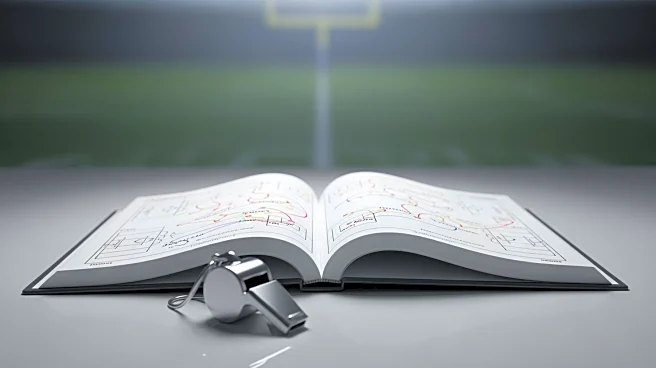What's Happening?
Aaron Roderick, the offensive coordinator for BYU, is preparing for another intense BYU-Utah football rivalry game. Roderick has been involved in this rivalry 21 times as a player or coach, and the upcoming
game will mark his 22nd involvement. Despite being fired from his position as Utah's co-offensive coordinator in 2016, Roderick has found success at BYU, contributing to the team's impressive 6-0 record in 2025. Under his guidance, freshman quarterback Bear Bachmeier has developed into a strong player, giving BYU a chance to upset the No. 23 Utah team. Roderick maintains a positive outlook on his past experiences at Utah, focusing on the achievements rather than the dismissal.
Why It's Important?
The BYU-Utah rivalry is a significant event in college football, drawing attention from fans across the state. Roderick's role in this rivalry highlights the competitive nature of college sports and the personal journeys of coaches and players. His ability to transition from a challenging end at Utah to a flourishing career at BYU demonstrates resilience and adaptability. This rivalry game not only impacts the teams involved but also influences the broader college football landscape, affecting rankings and perceptions of both programs. Roderick's success at BYU underscores the importance of effective coaching in developing talent and achieving team goals.
What's Next?
The upcoming BYU-Utah game is set to be a closely contested match, with BYU aiming to continue their winning streak. Roderick's strategic planning and coaching will be crucial in navigating the challenges posed by Utah, who are slight favorites. The outcome of this game could have implications for both teams' standings in the Big 12 conference and their prospects for postseason play. As the rivalry continues, both teams will likely focus on maintaining their competitive edge and addressing any weaknesses exposed during the game.
Beyond the Headlines
The BYU-Utah rivalry extends beyond the field, reflecting cultural and historical ties between the institutions and their communities. Roderick's experience on both sides of the rivalry offers insights into the dynamics of college sports and the personal relationships that develop over time. His approach to coaching, emphasizing preparation and professionalism, serves as a model for handling high-pressure situations and maintaining sportsmanship.









